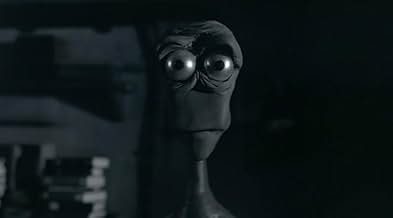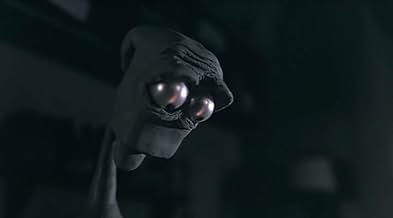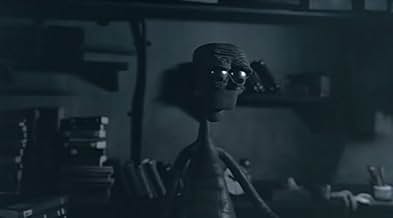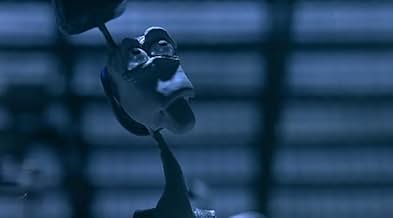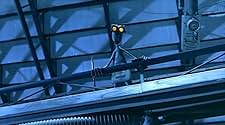More
- 1998
- 6 min
AVALIAÇÃO DA IMDb
8,1/10
6,3 mil
SUA AVALIAÇÃO
Adicionar um enredo no seu idiomaA factory worker creates a pair of goggles that puts its wearer in a state of bliss. But is that true happiness?A factory worker creates a pair of goggles that puts its wearer in a state of bliss. But is that true happiness?A factory worker creates a pair of goggles that puts its wearer in a state of bliss. But is that true happiness?
- Direção
- Roteirista
- Indicado a 1 Oscar
- 9 vitórias e 3 indicações no total
Avaliações em destaque
One of the most beautiful and poignant animated shorts I've ever seen, if not the most. Unfortunately, I got to see it only once and didn't get a chance to fully take it in, and there was definitely a lot there to take in. Some beautiful animation and a beautiful story about what happiness really is. Full of symbolism and a look at a future which may not be far off. Shows that happiness doesn't come in a box or any other sort of artificial means. Something which most of the world doesn't and probably never will get.
Wow. Who would have thought the entire meaning of life could be summed up in 6 minutes. The greatest of this film is its greatest irony, considering it questions the worth of success based on material wealth. The piece fits its soundtrack (Elegia by New Order) excellent as well. It's a shame this short lost out in the 1998 Oscars, I'd like to think that the voters had a chance to see it before deciding (although they probably didn't.) A definite 10.
10dynea
Everyone wants, expects, and demands more and more each day. We think we will get happier and richer by asking, giving and getting more. Are we though? Where is this taking us? This short film is very thought provoking. One can interpret it in multiple levels: political, religious, social etc. Politically there is subtle undermine of how it is almost impossible to rebel against the system. The workers of a factory in this film representing the workers of a capitalistic country who are like ants working their lives off in being productive and efficient to satisfy the demand of their consumptive society. These 'aunts' being controlled and pressured by others above them get worn out, ending up neglecting the meaning of life. Consequently, life seems dark, just like the colors of the film.
The religious implication is the sacrifice of the one for the benefit of the whole. In Christianity, Jesus Christ gave up his life to salvage humanity from the darkness of sin. In this short film, the main character gives up himself to salvage humanity from darkness. He opens 'the door' of his abdomen as if it was the gateway to his soul, taking out and giving to humanity the most precious part of his existence; his colorful soul. That is what it takes to make a change in our society.
As about the social implications, they are multiple. One of which is the monotonous routine the average blue-collar worker has in a developed capitalistic country. Waking up in the morning, going to work, doing repetitious work, getting pressured by the boss, going back home to sleep and repeat the same the next day and feel like nobody among the millions others.
In addition, regardless of the social status of each person, every adult is assigned with certain responsibilities and is expected to behave in a certain manner. Adults are not carefree and cannot act freely upon their feelings. Therefore, dreaming becomes a rescue zone. One is truly free in dreams, thus happy. The main character dreams about his childhood, the time he was carefree and happy. Becoming so nostalgic of the colorful times of his past, he turns into a restless and rebellious person, yearning to bring change into his dark world. He is determined to bring color and happiness back to life, regardless of the cost.
The cost of dreams is a notion highlighted by the director. Everyone has dreams. The demanding society we live in however, does not give us a lot of space to act upon them for free. Those who act upon them, have to sacrifice their lives in one way or another, whether that is the psychological, personal, financial, or even the physical aspect of their lives. How many get sick physically or psychologically from stress running after their dreams? How many drown in debt investing in their dreams? How many spend less and less time with their loved ones ending up losing them to get closer to their dreams? No one can make a dream come true without paying a price for it.
The main character ends up giving up his entire existence, body and soul, to bring this change in his world. His body represented as a piece of coal, and his spirit represented by the brightness of the red color coal which brought brightness, color, and happiness back to the world. It is interesting to note how the memories of his carefree, naive, and happy childhood has the same color as the pieces of the coal representing his soul.
The bottom line is that the main character succeeded in bringing change. Color and happiness was brought back to the world. However, the price was more than he expected. It cost him his life. Was it worth it? Probably it was for him. He finally sensed the almost forgotten feeling of happiness outside his dreams. He once again saw color in life - a notion pertained only to childhood before his sacrifice. Not only did he make himself happy, but he also endowed everyone else with happiness. He saved humanity from darkness. The question is what will happen after him? Will the rest of the individuals get inspired by him and follow his steps or are they going to follow the flock already organized for them for a dark, monotonous, meaningless ride on the road of life. It is a personal decision whether one will live to work or work to live. Which of the two one will get more of, is up to the individual!
The religious implication is the sacrifice of the one for the benefit of the whole. In Christianity, Jesus Christ gave up his life to salvage humanity from the darkness of sin. In this short film, the main character gives up himself to salvage humanity from darkness. He opens 'the door' of his abdomen as if it was the gateway to his soul, taking out and giving to humanity the most precious part of his existence; his colorful soul. That is what it takes to make a change in our society.
As about the social implications, they are multiple. One of which is the monotonous routine the average blue-collar worker has in a developed capitalistic country. Waking up in the morning, going to work, doing repetitious work, getting pressured by the boss, going back home to sleep and repeat the same the next day and feel like nobody among the millions others.
In addition, regardless of the social status of each person, every adult is assigned with certain responsibilities and is expected to behave in a certain manner. Adults are not carefree and cannot act freely upon their feelings. Therefore, dreaming becomes a rescue zone. One is truly free in dreams, thus happy. The main character dreams about his childhood, the time he was carefree and happy. Becoming so nostalgic of the colorful times of his past, he turns into a restless and rebellious person, yearning to bring change into his dark world. He is determined to bring color and happiness back to life, regardless of the cost.
The cost of dreams is a notion highlighted by the director. Everyone has dreams. The demanding society we live in however, does not give us a lot of space to act upon them for free. Those who act upon them, have to sacrifice their lives in one way or another, whether that is the psychological, personal, financial, or even the physical aspect of their lives. How many get sick physically or psychologically from stress running after their dreams? How many drown in debt investing in their dreams? How many spend less and less time with their loved ones ending up losing them to get closer to their dreams? No one can make a dream come true without paying a price for it.
The main character ends up giving up his entire existence, body and soul, to bring this change in his world. His body represented as a piece of coal, and his spirit represented by the brightness of the red color coal which brought brightness, color, and happiness back to the world. It is interesting to note how the memories of his carefree, naive, and happy childhood has the same color as the pieces of the coal representing his soul.
The bottom line is that the main character succeeded in bringing change. Color and happiness was brought back to the world. However, the price was more than he expected. It cost him his life. Was it worth it? Probably it was for him. He finally sensed the almost forgotten feeling of happiness outside his dreams. He once again saw color in life - a notion pertained only to childhood before his sacrifice. Not only did he make himself happy, but he also endowed everyone else with happiness. He saved humanity from darkness. The question is what will happen after him? Will the rest of the individuals get inspired by him and follow his steps or are they going to follow the flock already organized for them for a dark, monotonous, meaningless ride on the road of life. It is a personal decision whether one will live to work or work to live. Which of the two one will get more of, is up to the individual!
This is an absolutely astonishing short work concerning the meaning of life and what can not be manufactured in a synthetic factory. It presents a proletarian (in fantastic clay-mation) day in and day out, as he works in a factory assembly line building impersonal products to keep society happy. His dream is to one day create a new life affirming 'lense machine', for he is also an inventor with ingenuity.
In his struggles, he continues having glimpses of children playing around a merry-go-round and they are in vibrant color, while laughing and involved with joy. His dream is achieved, and then he becomes an over zealous capitalist who is sitting all alone in his skyscraper office, after directing the harsh void of the assembly line that manufactures his new product.
In the fleeting time that this short film runs, one gathers that it is something stupendous and magnificent, and the true satisfaction of creativity is not how many products one sells but the "fire that burns within"...
The song by the band 'NEW ORDER', is also melancholy, which adds to the ambiance, and is a joy to listen to.
Strongly recommended!
Look for it on Sci-Fi channel's "Exposure" or on PBS "High Intensity TV".
In his struggles, he continues having glimpses of children playing around a merry-go-round and they are in vibrant color, while laughing and involved with joy. His dream is achieved, and then he becomes an over zealous capitalist who is sitting all alone in his skyscraper office, after directing the harsh void of the assembly line that manufactures his new product.
In the fleeting time that this short film runs, one gathers that it is something stupendous and magnificent, and the true satisfaction of creativity is not how many products one sells but the "fire that burns within"...
The song by the band 'NEW ORDER', is also melancholy, which adds to the ambiance, and is a joy to listen to.
Strongly recommended!
Look for it on Sci-Fi channel's "Exposure" or on PBS "High Intensity TV".
That's the first word that came to mind after I watched this film. It is a sad, yet also touching study into the worth of happiness, and the repetition and dead-endness of working class jobs. This film was done using stop-action claymation and is probably one of the best (if not the best) one made. It was nominated for a 1998 Academy Award for Best Short Animated Film. Some screenings are available on the net, so if you ever come across it, check it out!
Você sabia?
- CuriosidadesAwarded the Best Short Film at the 1999 Sundance Film Festival.
- Versões alternativasThe film was re-edited and released as a music video for the song "Hell Bent" by Kenna.
- ConexõesFeatured in Film-Fest DVD: Issue 2 - Cannes (1999)
- Trilhas sonorasElegia
Written, Produced and Performed by New Order
Principais escolhas
Faça login para avaliar e ver a lista de recomendações personalizadas
Detalhes
- Data de lançamento
- País de origem
- Central de atendimento oficial
- Idioma
- Também conhecido como
- Ще
- Empresas de produção
- Consulte mais créditos da empresa na IMDbPro
- Tempo de duração6 minutos
- Cor
- Proporção
- 1.44 : 1
Contribua para esta página
Sugerir uma alteração ou adicionar conteúdo ausente


